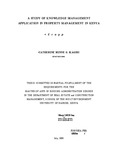| dc.description.abstract | The business environment is constantly evolving, and this was especially evident in the
late zo" century. The new business environment included changes like globalisation,
increased use of technology, cultural and gender diversity; and demands for power and
control by employees.
In the fast changing business environment, knowledge is recognized as a major asset in
the firm. Any business organization or firm's competitive leverage is reliant on its
knowledge assets. The value of the knowledge assets can exceed that of all the firm's
physical assets. Knowledge assets may be packaged as experienced staff, patents,
licenses and even manuals, reports and minutes of meeting's.
Knowledge is information in use or action. This results in a wealth of knowledge being
created through experience, and integrated with cultural beliefs. Knowledge enables
firms to make decisions for an uncertain future. In addition, knowledge allows firms to
predict future events and discern certain trends that can provide future opportunities.
Wealth of knowledge also enables the firm to operate efficiently.
This study was prompted by an observation that the property management firms are
trying to survive in an increasingly competitive business environment. Knowledge is
the lifeline for the property management firm's business processes, as each department
relies heavily on the knowledge of other departments, so as to function efficiently.
The main research objective for the study was to establish the nature and extent of
knowledge management practices in Kenyan property management firms. As this was
an exploratory study, it attempted to identify the extent to which the core processes of
knowledge management (creation of new knowledge, storage of knowledge,
distribution of knowledge, and the application of knowledge), were implemented. The
research was conducted by surveying private property management firms in Nairobi.
A Study of Knowledge Management Application in Property Management in Kenya
Data was collected through personal interviews and a structured questionnaire
(Appendix I).
The study revealed that knowledge management practices are limited in property
management firms. However, it also revealed that relevant knowledge management
expertise is lacking, and may deter the right type of knowledge from being gathered,
stored or distributed within the property management firms.
In conclusion, it was found that there was a need for increased awareness on the
practice of knowledge management within the property management firms. It is
recommended that specialized training in knowledge management for Property
Management firms is necessary. | en |

